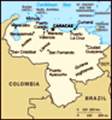Advertisement
Published: October 25th 2015
The Orinoco Delta
Caracas airport looks like an aviation museum. I flew in something from the 1960s with engines bolted to the back of the fuselage just in front of the tail. Given the warnings on government websites about Venezuela (frequent kidnappings, violence, armed robbery etc) I had booked all cars, tours and accommodation in advance. This helped as I was met at every location and got around the country in private cars that blended in with ordinary traffic. The drive to the port at the edge of the delta was through flat, featureless farmland with only one distinguishing feature, it was abandoned and not being farmed. My driver explained that a few years earlier the then president, Chavez, claimed that the price of meat, around 2000 Bolivars ( $3US on the black market ) was too high and the fault of capitalist farmers and butchers exploiting the poor. The decreed that as of the next day meat would cost 300 bolivars and sent the police and army to all the butchers shops to enforce it. The problem was that within a week the shops were empty and before long the farms were abandoned. My drivers favourite story concerned the
current president and toilet paper. This was in short supply and causing disquiet. The president interrupted live prime time TV to announce that he had sent a delegation overseas to negotiate for an improved supply. Unfortunately this was only a short term fix and the grumbling continued. Several months later this president again took over the airwaves and took his people to talk for complaining so much. He pointed out that the supply of toilet paper was what it always had been and that the shortage was caused by increasing demand. His logic was that people must be getting more to eat and therefore using more toilet paper. He told the people that this was a sign of prosperity and that they should be grateful. Certainly, Venezuela felt very different to the 'Andean' nations that I had travelled from. People didn't make eye contact or smile. There were frequent police checkpoints and the roads were in a terrible state. All the houses were the same style, a simple small rectangle, sometimes with a small corner cut out to act as a porch. They were rendered, and had once been painted pastel colours, but all were badly faded. On reaching a
branch of the Orinoco I transferred to a fibreglass boat and headed downstream. As we went deeper into the delta the houses on the banks gradually changed from the rectangular cottages with tin roofs, to wooden huts with roofs made of palm leaves. We turned into a smaller channel and saw a pod of river dolphins, minutes later we turned again, into a creek so narrow that it was possible to touch the vegetation on both banks at the same time. Soon we reached a clearing where the lodge could be seen in a quite magical location. I had my own over water bungalow to enjoy the sounds of the forest and the darkness of the night From the lodge I explored the delta, walked the rainforest and visited local tribes. The vegetation wasn't as tall or grand as in the Amazon, and few trees were too wide to reach around. The guide insisted that this is primary forest, that is, it hadn't been cleared and regrown. I wonder if the meandering channels erode so rapidly that little forest has a chance to reach maturity. Despite this there is plenty of wildlife, I saw the howler monkeys that I had
only heard in the Amazon, also Capuchin monkeys, two species of snake, related to boa constrictors, one so close I was able to touch it. There were also many species of birds including large Eagles. The local Indian tribes were friendly and welcoming. Most made simple handicrafts to sell to the few tourists they encountered. They lived in large open shelters, with palm leaf roofs to keep out the rain, but open sides to allow the breeze through. The temperature was high 30s to low 40s so the breeze was essential. Despite this a small fire burned, so the smoke would discourage mosquitoes. The people fish, hunt and gather, but supplement their diets with crops. While the delta is officially protected, local people clear small areas to grow manioc, bananas and other crops, both to eat and as a source of income. I saw several clearings, but in the vastness of the delta, I feel these indigenous people have the right to make an income from their home. My first day at the lodge there were a total of three guests, by my last day I was the only one. For my guide, the chef, the boat driver and the
couple of odd job guys, my custom was definitely a benefit rather than a hassle. We visited another lodge with no guests at all. The levels of crime have decimated the tourism industry and wages are so low, even one tourist can provide an income for several local people. The Orinoco delta was a real highlight of my trip. I hope the situation in Venezuela improves and more people get to experience this amazing place.
Advertisement
Tot: 0.093s; Tpl: 0.013s; cc: 11; qc: 48; dbt: 0.0572s; 1; m:domysql w:travelblog (10.17.0.13); sld: 1;
; mem: 1.1mb


























Dad
non-member comment
Super and amazing what an experience